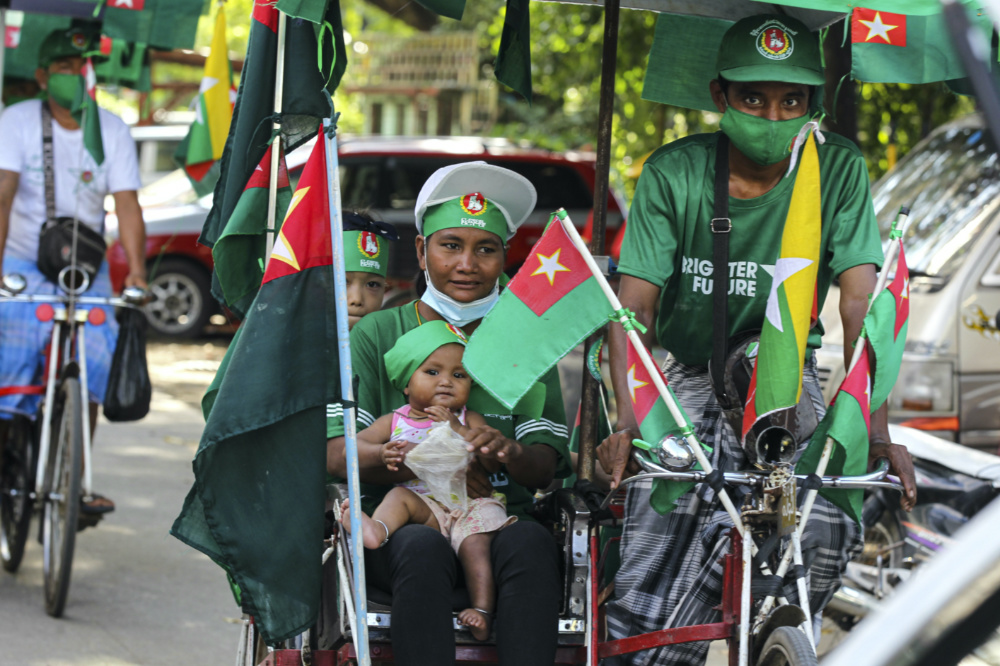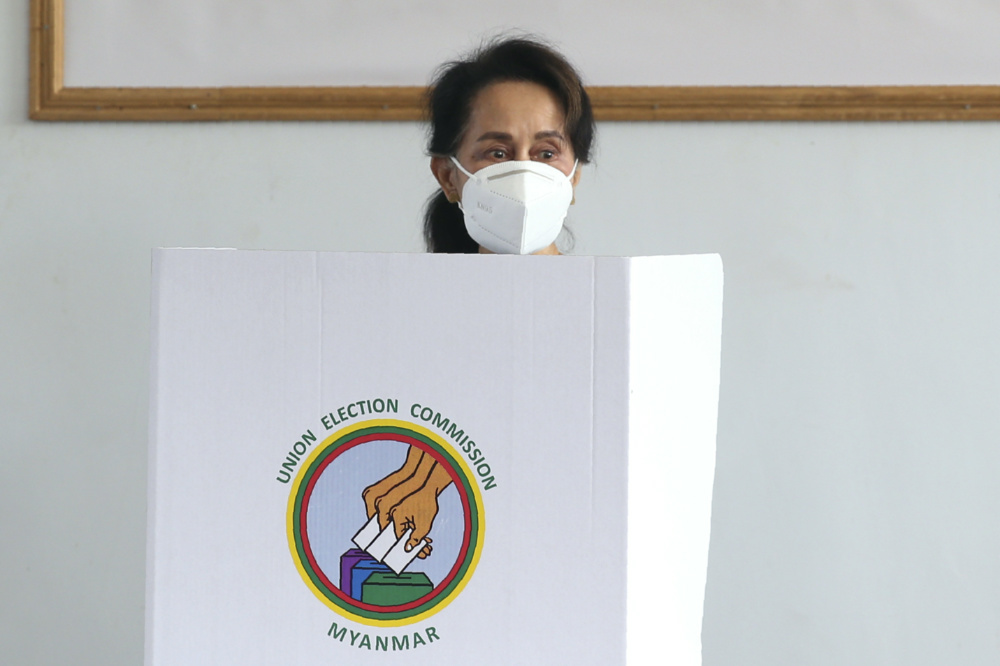Bangkok, Thailand
AP
Myanmar’s citizens go to the polls Sunday in an effort to sustain the fledgling democracy they helped install just five years ago.
There are about 37 million registered voters, though turnout is expected to suffer because of a recent surge in coronavirus cases.

A supporter of the military-backed Union Solidarity and Development Party (USDP) holds a toddler while onboard a trishaw during an election campaign motorcade in Yangon, Myanmar, on Thursday, 5th November. Myanmar’s citizens go to the polls on Sunday, 8th November, in an effort to sustain the fledgling democracy they helped install just five years ago. PICTURE: AP Photo/Thein Zaw.
In 2015, excitement was high over the opportunity to end more than five decades of army-directed rule. The National League of Democracy party of Nobel Peace Prize laureate Aung San Suu Kyi roared to a landslide election victory, and she became her country’s leader after many hard years at the forefront of a non-violent struggle against military dictatorships that won international admiration.
UN URGES CEASEFIRE TO TACKLE VIRUS AHEAD OF MYANMAR VOTE
The UN chief appealed for a cease-fire across Myanmar ahead of Sunday’s elections to tackle surging COVID-19 cases, expressing concern at intensifying clashes including in Rakhine State where hundreds of thousands of Rohingya Muslims can’t vote because the government has denied them citizenship.
Secretary-General Antonio Guterres appealed for a global cease-fire to tackle the COVID-19 pandemic on 23rd March, and UN spokesman Stephane Dujarric said the UN chief was renewing his appeal on Friday to focus on combatting the surge in coronavirus cases in Myanmar.
Dujarric said the secretary-general believes “the holding of peaceful, orderly and credible elections is an important opportunity to help advance inclusive sustainable development, humanitarian action, human rights and democratic reforms, including civilian control over the military.”
Guterres also hopes the elections will “help pave the way for refugee returns in safety and dignity,” he said.
Dujarric said the secretary-general is concerned at the “legal limbo” of the Rohingya in Rakhine and their inability to vote.
“It is important that everyone have a voice and be able to participate in these elections in a very…inclusive way,” he said.
In renewing his cease-fire appeal, the secretary-general “remains concerned about armed conflict in many areas of Myanmar, especially the intensifying clashes in Rakhine and Chin states, which continue to take a heavy toll on vulnerable civilians,” Dujarric said.
Guterres urges all combatants “to respect their obligations under international humanitarian law and to protect civilians and civilian infrastructure,” he said.
The secretary-general says unimpeded humanitarian access for the UN and its partners “is crucial,” Dujarric said.
– EDITH M LEDERER, AP
This year, her party is expected to again top the polls, but some critics feel her administration has failed to embrace democratic principles.
Chances for real reform were always dicey, as the 2008 constitution drafted under the military assures it of enough seats in parliament to block charter changes. Key ministries are also under the control of the military.
Critics accuse 75-year-old Suu Kyi and her party of being more concerned about entrenching itself in power than encouraging a broad-based democracy.
“This time, neither Aung San Suu Kyi nor her party is bringing democracy to Myanmar. Instead, they are trying to bring in a one-party democracy system,” charged Khin Zaw Win, director of the Tampadipa Institute, a Yangon-based policy advocacy group.
Enfeebling other parties has meant there has been little real debate about policies during the campaign. Myanmar needs a better political mix, he said.
Even the voting process has become enmeshed in controversy, as the state election commission has been accused of conniving with Suu Kyi’s ruling party by cancelling voting in some areas where parties critical of the government were certain to win seats.
The Union Election Commission insisted the voting was canceled because of armed conflict with ethnic guerrillas in those areas.
The decision was one of several points criticised this past week by Thomas Andrews, the UN special rapporteur for human rights in Myanmar.
Buddhist-majority Myanmar, he said, would not be able to hold free and fair elections “as long as…the right to vote is denied based on race, ethnicity or religion, as it is with the Rohingya.”

In this 29th October, file photo, Myanmar leader Aung San Suu Kyi votes in advance at the Union Election Commission office in Naypyitaw, Myanmar. PICTURE: AP Photo/Aung Shine Oo/File photo.
Long-standing prejudice against the Muslim Rohingya minority, whom many consider to have immigrated illegally from South Asia even though their families have lived in Myanmar for generations, has deprived most of them of the rights of citizenship.
Western friends of Myanmar were shocked at the brutal 2017 counter-insurgency campaign by Myanmar’s army that drove about 740,000 Rohingya to flee into neighbouring Bangladesh, drawing accusations of genocide.
It also sent Suu Kyi’s reputation with Western admirers into a tailspin when she failed to restrain the security forces. But for most people in Myanmar, the Rohingya are not an issue in the election.
Andrews also said opposition political parties claim they are denied access to state media and their messages have been censored for criticising government policies.
Measures to control the coronavirus severely restricted traditional large-scale campaigning by all parties, but Suu Kyi benefits from frequent reports in state media about her carrying out her official duties, and from her regular updates about fighting the coronavirus streamed on her Facebook page.
Her administration had already been criticised by free speech advocates. It scrapped some censorship and licensing laws, but aggressively employs defamation and telecommunications laws against journalists and activists critical of the government and the military.
Failure of much-touted plans to reconcile with the country’s fractious ethnic minorities is another dent in Suu Kyi’s reputation. Ethnic minority groups, mainly in border areas, have for decades been engaged in on-again, off-again armed struggle for autonomy.
Ethnic political parties in 2015 worked out tactical agreements with the NLD to ensure victory against the military-backed Union Solidarity and Development Party, the main challenger to Suu Kyi’s party.
This year, disappointed with Suu Kyi’s failure to seal a deal expanding their political rights, they will be pushing only their own candidates.
Nevertheless, Suu Kyi remains the country’s most popular political figure by far.
“I think it is really the personal support, even love, that many people have for Aung San Suu Kyi herself, almost irrespective of how the government administration performs, how the economy performs and so on,” Yangon-based political analyst Richard Horsey said of her appeal.






